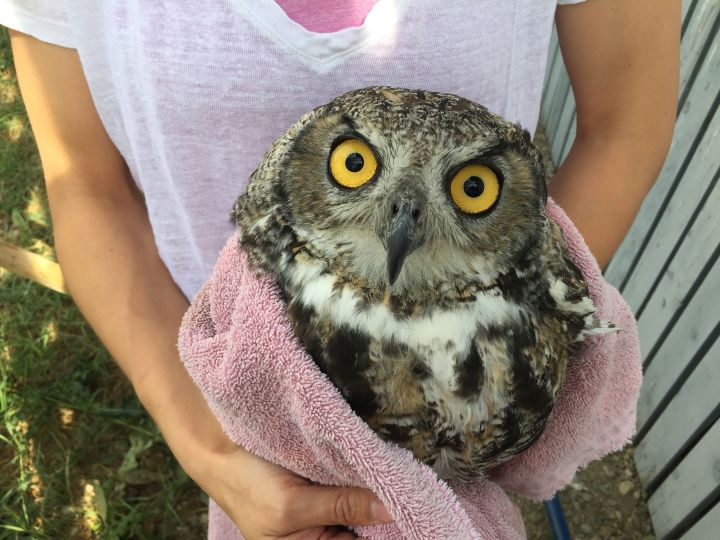The Alberta Institute for Wildlife Conservation (AIWC) says an injured great-horned owl is “flying beautifully” after recovering from surgery to treat a left humerus fracture. The adult owl is set to be released in Calgary on Friday night after spending six weeks recovering at the centre.

Veterinarian Dr. Nicole Rose said the owl was brought to a partner clinic, the Southern Alberta Veterinary Emergency clinic (SAVE) in Okotoks, on July 19. A Good Samaritan found the animal and said it was sitting near a tree, unable to fly. SAVE then took X-rays and sent them to Rose at AIWC.
The rehabilitation involved surgery using pins to align the owl’s bones, treating the animal with pain medication and conditioning in an outside enclosure.
“I put pins in,” Rose said. “They have to stay in for three weeks, then I pull them out once the bones heal.”
Rose said great-horned owls are notorious for pulling things out, “but he was quite good; he kept everything in.”
Rose said surgery went well and the post-op care continued to make sure the owl was eating, was not too stressed.
“When I pulled the hardware out, the wings looked great,” she said.
“He’s flying beautifully – nice and quiet.”
Silent flying is important for an owl’s night hunting. Once the recovering owl’s flight was deemed silent and he could make a certain number of passes in the enclosure without tiring, he was deemed releasable, AIWC said.
The not-for-profit rehab centre said 95 per cent of the more than 1,800 animals its staff treats each year are injured or orphaned due to human activity, but didn’t have information as to how this owl was injured.
Rose said any donations of equipment can help in the costly treatment of the animals.
“For this clinic, it’s the first owl that we’ve done,” she said. “I’ve done crows, magpies, other things like that.
“If anybody knows someone with used equipment – a doppler or surgical instruments, anything like that – it makes everything safer for us with higher-level equipment.”
Rose said a doppler is a device commonly used with small-animal medicine.
“You put it over a pulse and it picks up the heart rate so you can hear it while doing surgery,” she said, adding it also measures blood pressure.
For more information on AIWC, visit the website here









Comments